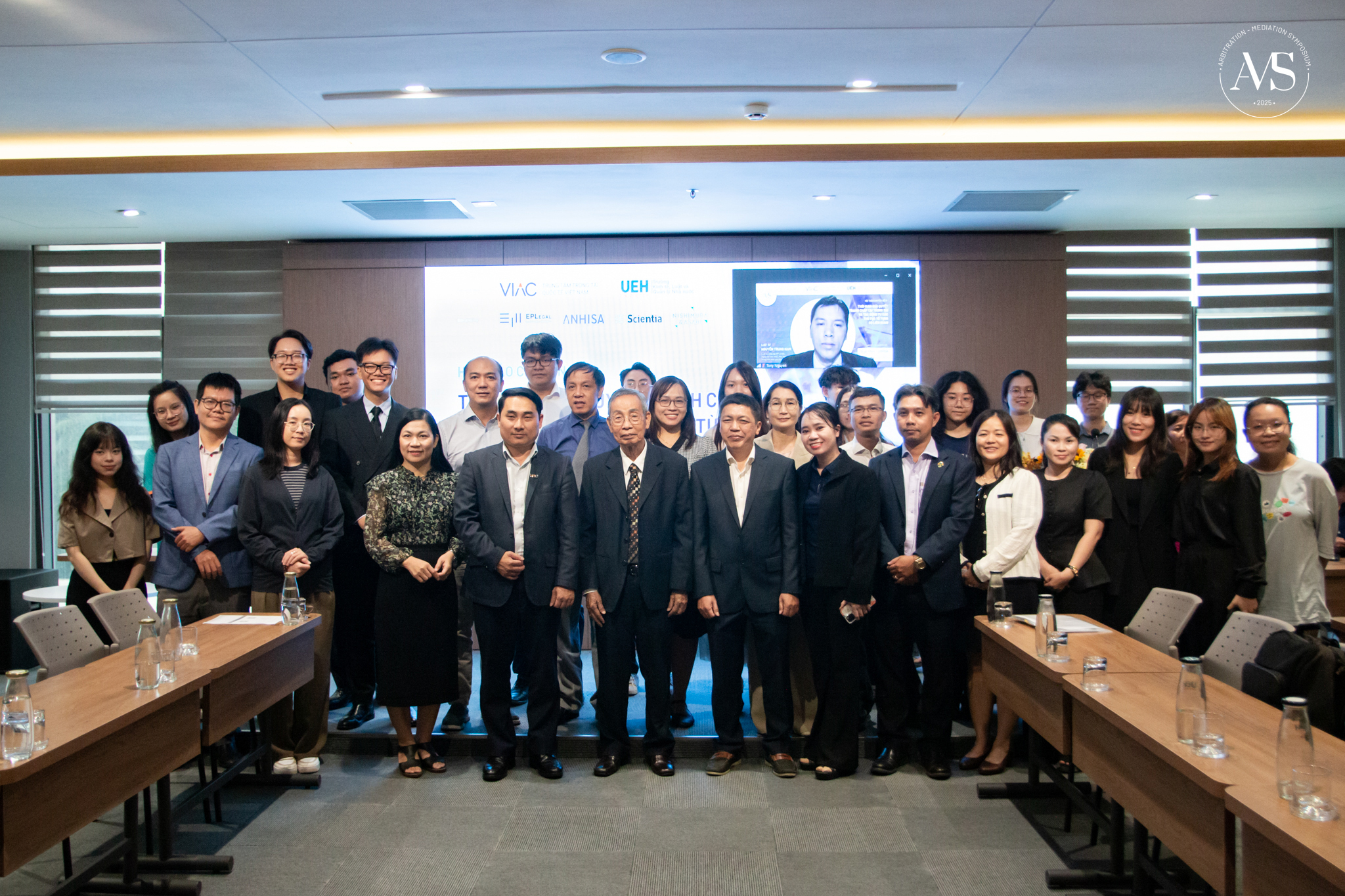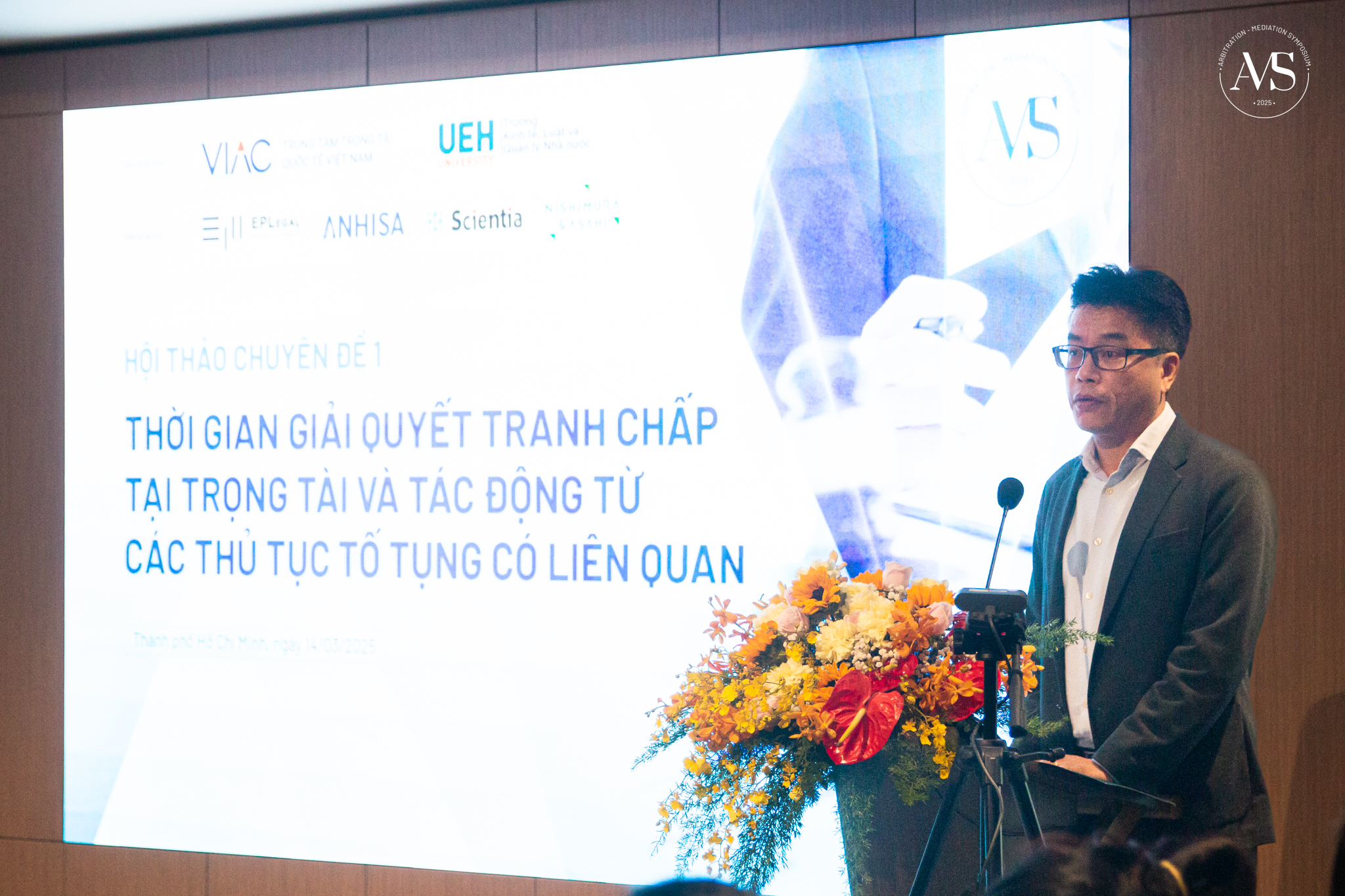Known as a pivotal professional events series annually organized by the Vietnam International Arbitration Centre (VIAC) in coordination with legal training institutions, the Arbitration – Mediation Symposium (AMS) has received significant attention from researchers, scholars, counsels and experts in the field of law. AMS 2025 marks the third consecutive year the Symposium has been implemented. Centered around the main theme “Time management in Arbitration: Practical necessity and implementation tools”, AMS 2025 consists of three workshops and one symposium, scheduled to take place on every Friday from March 14, 2025 to April 4, 2025.
To begin the AMS 2025, on the morning of March 14, 2025, the Vietnam International Arbitration Centre (VIAC), in collaboration with the College of Economics, Law and Government, under UEH University (CELG - UEH), organized Workshop 01: “Time efficiency in arbitration under the effect of parallel proceedings”. The Workshop attracted nearly 200 participants, including arbitrators, mediators, lawyers, in-house counsels, and other legal professionals.
Assoc. Prof. Dr. Pham Khanh Nam – Dean of College of Economics, Law and Government,
University of Economic Ho Chi Minh City (UEH - CELG)
Representing the College of Economics, Law and Government, under UEH University (CELG - UEH), Assoc. Prof. Dr. Pham Khanh Nam – Dean of CELG - UEH, expressed his appreciation for the initiative of organizing the Workshop and highlighted its significant value. He emphasized that this is the third consecutive year that CELG - UEH has jointly organized with the Vietnam International Arbitration Centre (VIAC) a Workshop within the AMS. This cooperation underscores the strong partnership between the two institutions in advancing academic research and fostering professional discussion on arbitration and mediation. Assoc. Prof. Dr. Pham Khanh Nam affirmed that the Workshop serves not only as an academic forum but also as a networking platform for researchers and legal practitioners. Through in-depth discussions, the Workshop contributed to identifying practical solutions, thereby enhancing the legal framework governing arbitration, and moving towards greater alignment with international best practices. Ultimately, improvements to the legal infrastructure will strengthen businesses’ confidence in efficient dispute resolution mechanisms, thereby promoting more sustainable and secure investment and business activities in Vietnam.
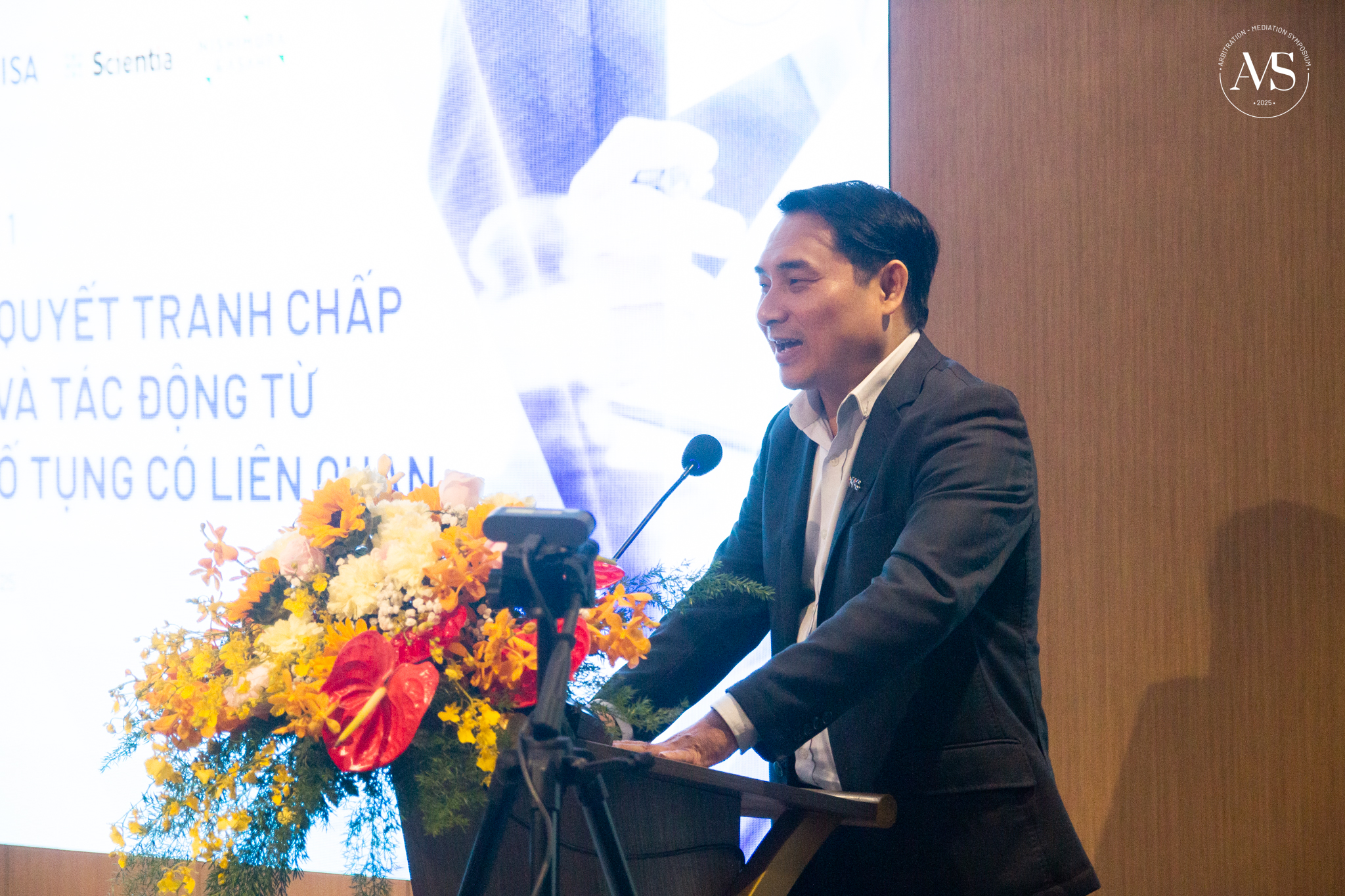
Mr. Chau Viet Bac - Vice Secretary General of Vietnam International Arbitration Centre (VIAC)
Mr. Chau Viet Bac - Vice Secretary General of Vietnam International Arbitration Centre (VIAC), delivered the opening remarks at the Workshop. He asserted that a prominent advantage of commercial arbitration in particular, and alternative dispute resolution (ADR) methods in general, is their time efficiency. However, this attribute has recently been significantly impacted, especially by parallel legal proceedings initiated during the arbitral proceedings. According to Mr. Bac, while such situations are not frequent, they present considerable complexity, demanding close coordination among the relevant authorities. He further indicated that the current legal framework remains inadequate in addressing and regulating these cases, thereby risking the disruption or prolongation of arbitral proceedings. This, in turn, can adversely affect the conduct and rights of the disputing parties, as well as the overall effectiveness of this dispute resolution method. Mr. Bac expressed his expectation that the discussions at the Workshop would contribute to identifying effective solutions, thereby improving the coordination mechanism between arbitration and relevant authorities, ultimately enhancing both the efficiency and practical viability of arbitral proceedings in Vietnam.
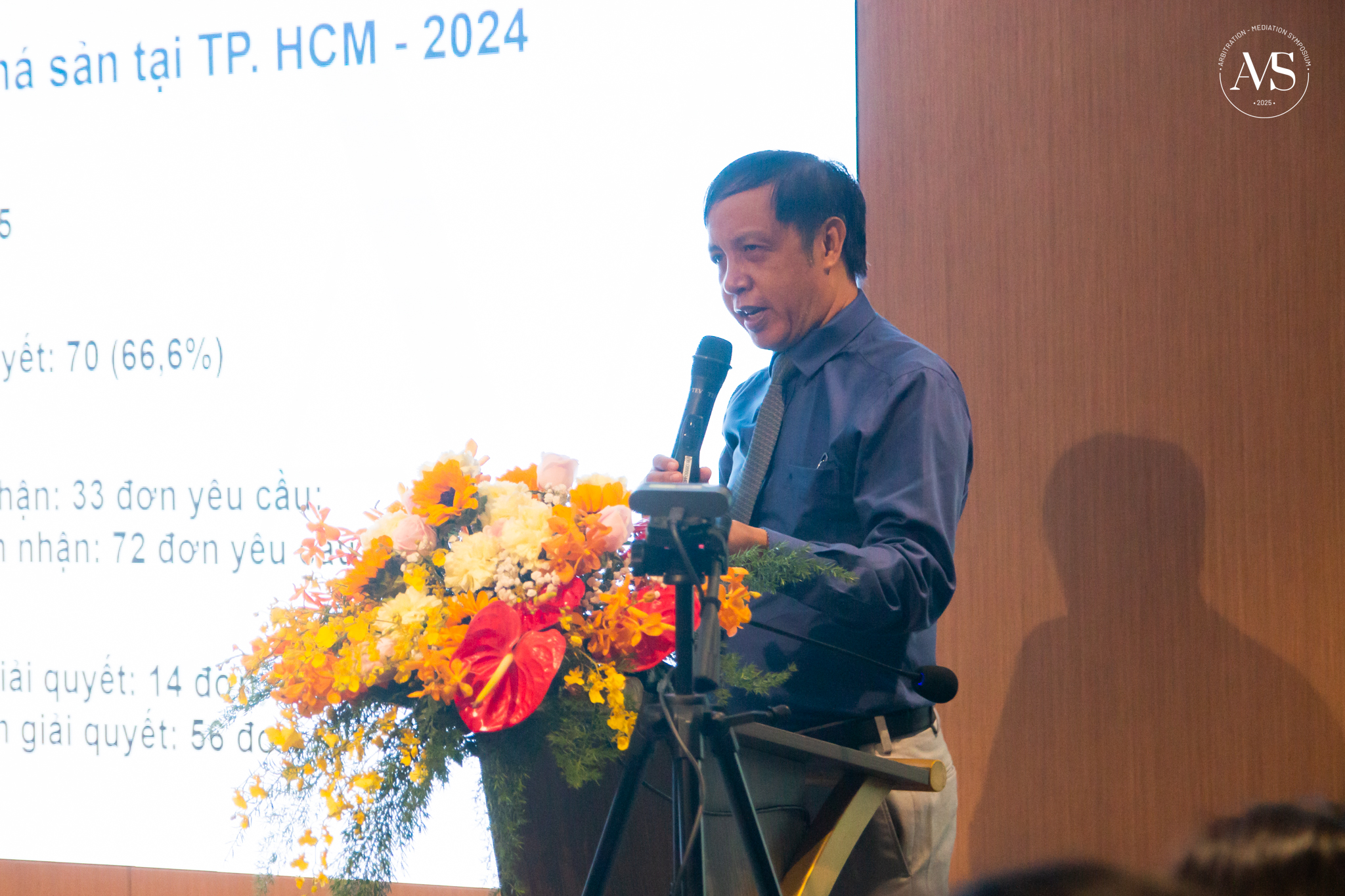
Dr. Tran Huynh Thanh Nghi – Director of Economics Law Program, School of Law,
College of Economics, Law and Government, University of Economic Ho Chi Minh City (UEH - CELG)
At the Workshop, Dr. Tran Huynh Thanh Nghi – Director of Economics Law Program, School of Law, College of Economics, Law and Government, University of Economic Ho Chi Minh City (UEH - CELG) – delivered a presentation titled “The conduct of arbitral proceedings upon the commencement of insolvency procedures: Legal framework and practical insights”. In his presentation, Dr. Nghi analyzed the current legal provisions and highlighted the challenges in applying them when a party to an arbitral dispute becomes subject to bankruptcy proceedings, in the context where Vietnamese law lacks specific regulations governing such situations. Among the key issues raised were: the risk of arbitral awards being set aside by the court; the complexity of the applicable legal framework and the lack of compatibility between arbitral and judicial proceedings. From a comparison perspective, Dr. Nghi pointed out that while the 2015 Civil Procedure Code provides clear provisions on this matter, the 2010 Law on Commercial Arbitration offers only general guidance and lacks coherence with the Law on Bankruptcy. By using an ongoing arbitration case in which the court issues a decision to initiate bankruptcy proceedings for one of the disputing parties as an example, Dr. Nghi had emphasized the lack of guidance in 2010 LCA for handling such situations. This raises the question of whether the Arbitral tribunal should temporarily suspend, terminate, or proceed with the case.
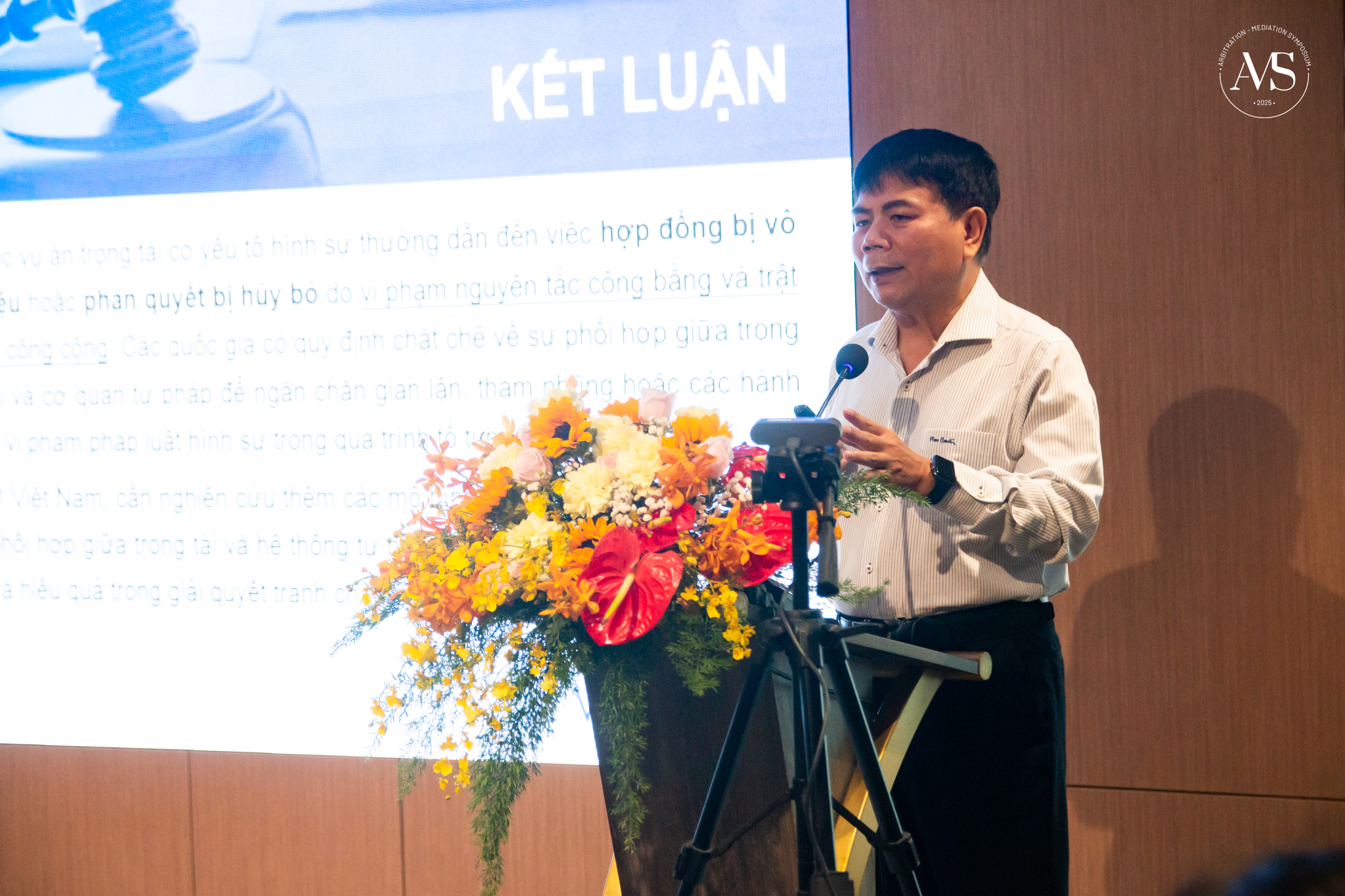
Mr. Le Thanh Kinh – Director of Le Nguyen Law Firm, Arbitrator of Vietnam International Arbitration Centre (VIAC),
Mediator of Vietnam Mediation Centre (VMC)
Following Dr. Tran Huynh Thanh Nghi’s presentation, Mr. Le Thanh Kinh – Director of Le Nguyen Law Firm, Arbitrator of VIAC, Mediator of VMC has provided an exhaustive analysis of the impact of criminal elements over the arbitration process. He observed that, both in Vietnam and internationally, commercial disputes involving criminal aspects often revolve around acts such as fraud, corruption, bribery, and money laundering… Furthermore, Mr. Kinh evaluate the implications of such criminal elements on arbitral proceedings, notably: (i) Prolonged the arbitral proceeding, as the Arbitral tribunals may be required to suspend or terminate the proceedings depending the outcome of criminal investigations; (ii) Increased the risk of arbitral awards being set aside by courts; and (iii) Limiting arbitrators’ jurisdiction over matters involving criminal liabilities. Drawing from Vietnam dispute resolution practical issues and in comparison with international models on coordination between arbitration and judicial authorities, Mr. Kinh suggested that Vietnam should conduct further research into well-established models from jurisdictions such as the United States, the United Kingdom, France, and Singapore. He proposed that the process of amending and supplementing the LCA should more specific, establish a clear coordination mechanism, thereby ensuring effective control and resolution of disputes where criminal elements are involved.
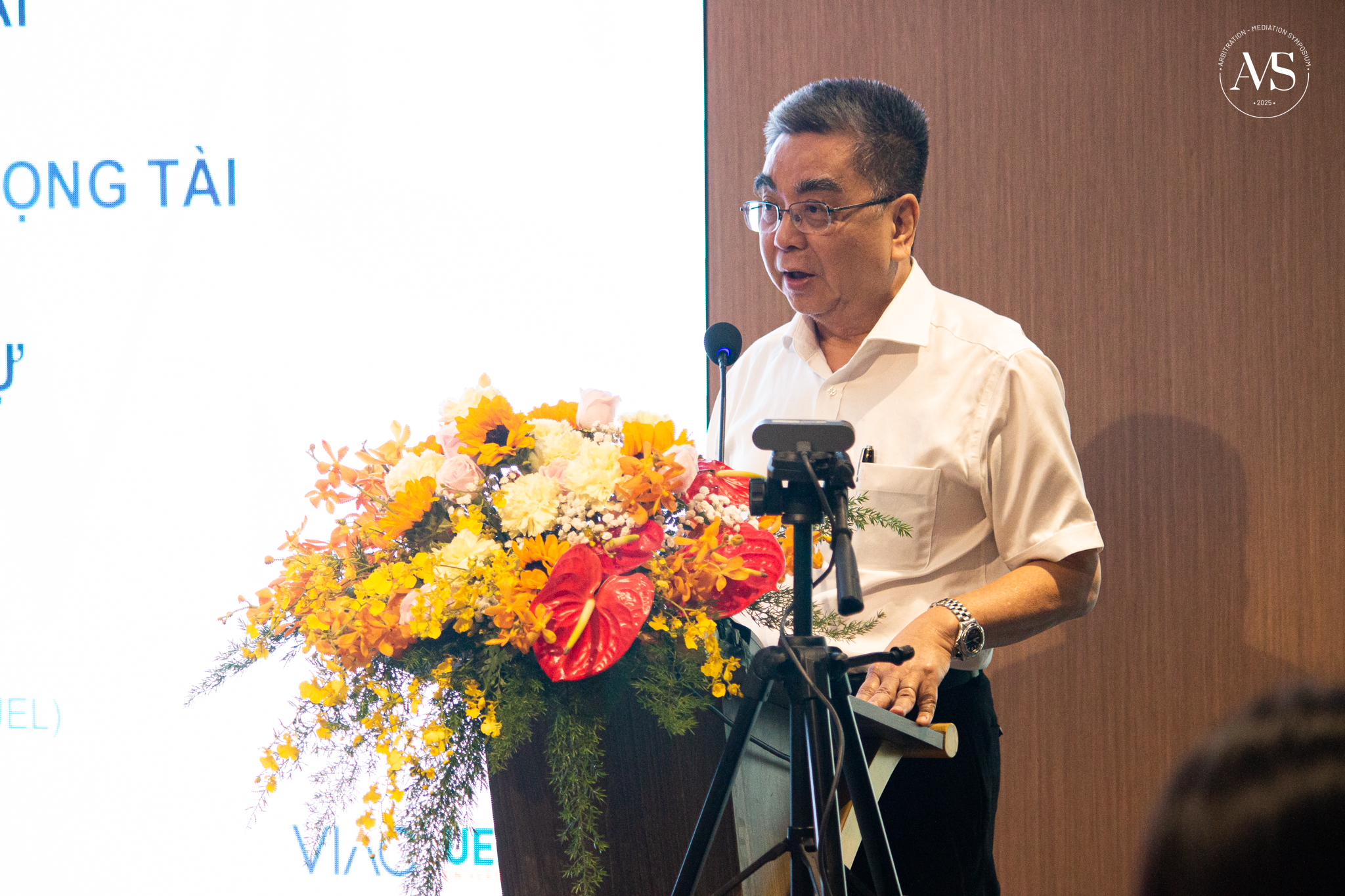
Academician, Assoc. Prof. Dr. Nguyen Ngoc Dien – Senior Advisor, Institute of International and Comparative Law,
University of Economics & Law, Viet Nam National University Ho Chi Minh City (UEL)
Regarding the coordination mechanism between arbitration and relevant authorities, Academician, Assoc. Prof. Dr. Nguyen Ngoc Dien – Senior Advisor, Institute of International and Comparative Law, University of Economics & Law, Viet Nam National University Ho Chi Minh City has evaluated this aspect from a comparative viewpoint between international experience and the particular characteristics of the Vietnamese legal framework. According to Dr. Dien, internationally, Kompetenz-Kompetenz (the power of an arbitral tribunal to rule on its own jurisdiction) is widely respected. This principle allows arbitral tribunals to maintain their jurisdiction and limits interference from civil and criminal proceedings, meaning that even when the court is concurrently handling a related civil or criminal matter, the arbitral tribunals may still keep proceed with resolving the dispute, unless the court determines that the dispute falls outside the scope of arbitration or that the arbitration agreement is invalid. However, in Vietnam, due to the particularities of the current legal framework, parties have the right to petition the courts to review the jurisdiction of the arbitral tribunal, especially in where arbitral proceedings are parallel conducted with civil or criminal litigation. This procedural overlap may create certain adverse impacts on the efficacy and independence of arbitration in the dispute resolution process.
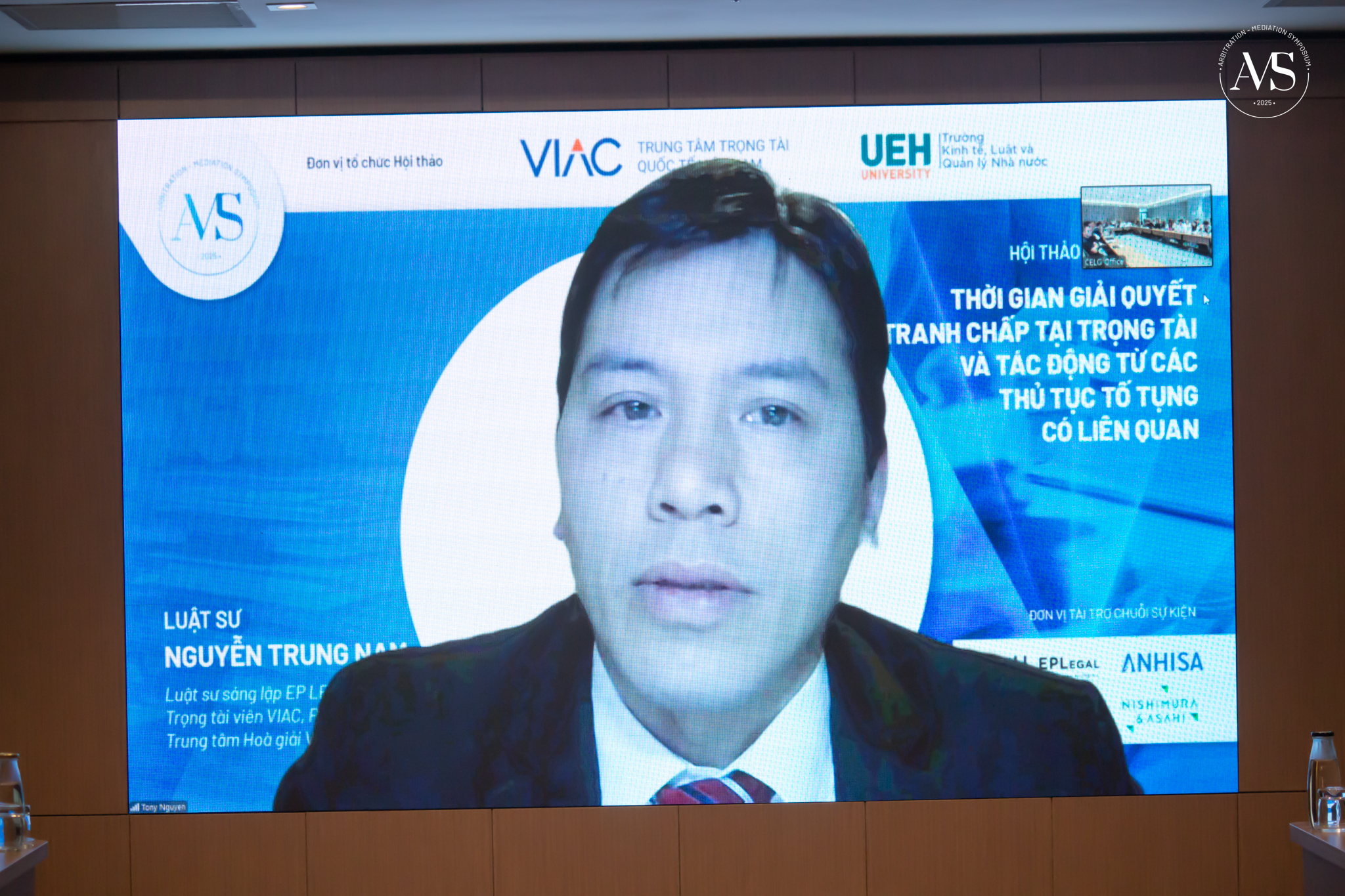
Dr. Nguyen Trung Nam - Founder of EPLegal, Arbitrator of Vietnam International Arbitration Centre (VIAC),
and Deputy Director of Vietnam Mediation Centre (VMC)
Aiming to provide a deeper analysis over the issue of “suspension” in arbitral proceedings from the perspective of international experience and practical application in Vietnam, Dr. Nguyen Trung Nam - Founder of EPLegal, Arbitrator of VIAC, and Deputy Director of Vietnam Mediation Centre (VMC) had come up with the presentation titled: “Stay of proceedings in arbitration: Practical applications in Vietnam and international experiences”. Through his presentation, Dr. Nam highlighted the lack of provisions for suspension in arbitral proceedings, including applicable circumstances, procedural steps, duration, as well as mechanisms for oversight and appeal. This absence of clear regulation has resulted in inconsistent application among arbitration centres, posing challenges for Arbitral Tribunals in deciding whether and how to suspend proceedings. Based on international practices, Dr. Nam underscored a prevailing trend of respecting party autonomy, while also upholding the oversight role of arbitral tribunals to ensure fairness, procedural efficiency, and a careful balancing of the parties’ interests. Accordingly, arbitration institutions in Vietnam should also handle suspension requests in a flexible way, while also aligned with the fundamental principles of arbitral procedure. In addition, Dr. Nam advised disputing parties to be cautious when consenting to or opposing a request for suspension and to develop effective negotiation strategies during the period. Stem from the presentation, Dr. Nam suggested two legislative in order to improve the legal framework governing suspension in arbitration: (i) Expand and clarify the powers of the Arbitral Tribunal; or (ii) Incorporate specific provisions on suspension into the procedural rules of each arbitral institution.
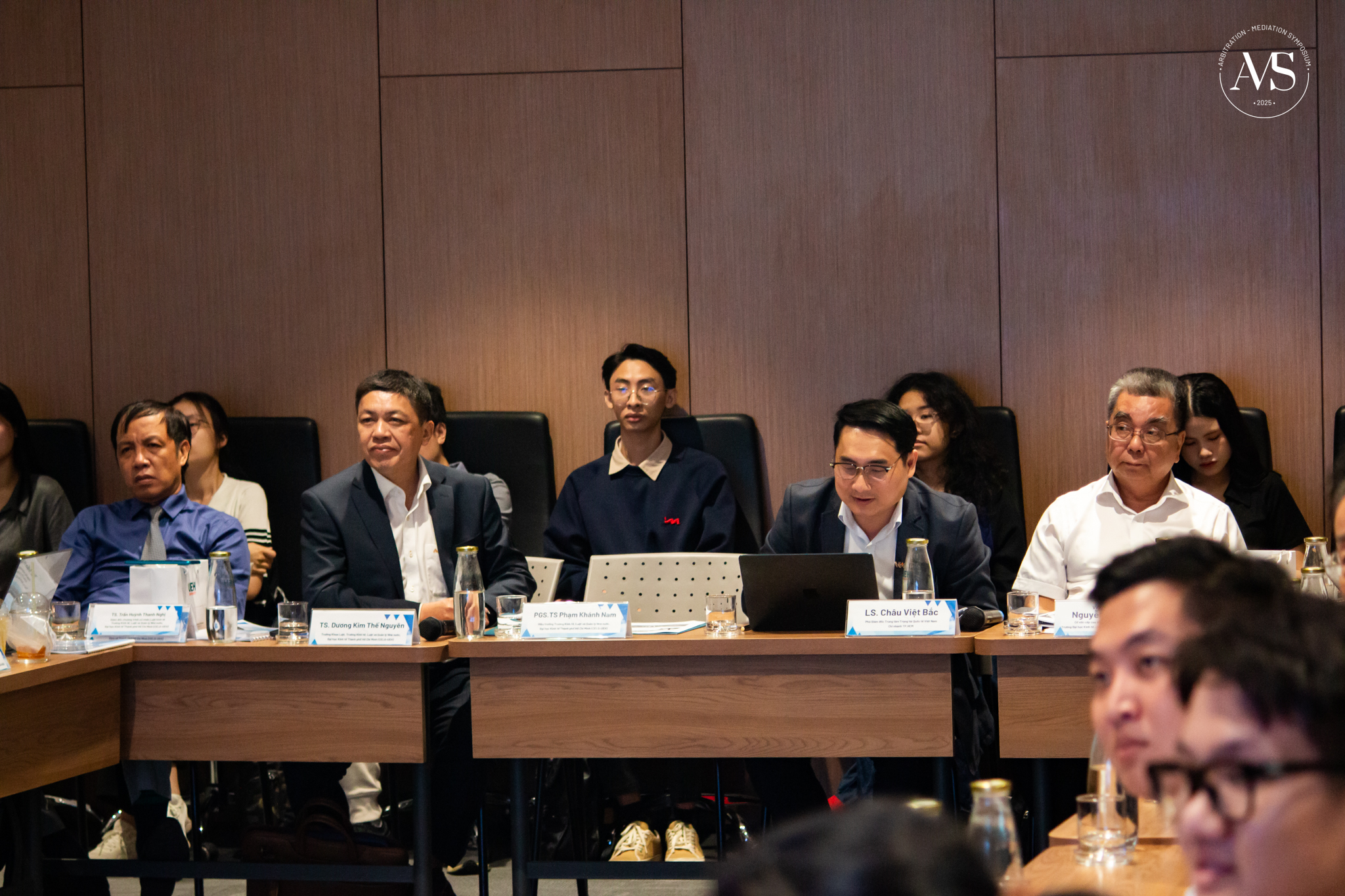
Followed by the speakers’ presentations, the Workshop proceeded to a plenary discussion session, co-moderated by Dr. Duong Kim The Nguyen, and Mr. Chau Viet Bac. The discussion session was marked by active and multidimensional exchanges, creating an open forum for interaction among experts, arbitrators, lawyers, and other participants. The perspectives and proposals shared not only helped to clarify practical issues but also contributed to shaping possible solutions for the future improvement of Vietnam’s arbitral legal framework.
📃Event's Materials: Please refer HERE
📃Event's Photos: View more HERE
As part of the Arbitration – Mediation Symposium 2025 (AMS 2025), and following the success of AMS Workshop 01, VIAC - VMC will continue their collaboration with UEF to organize AMS Workshop 02 under the theme "Strategies for enhancing time efficiency through the combination of arbitration and mediation".
📅 Time: 08:00 – 11:45, Friday, March 21, 2025
📌 Venue: Democracy Meeting Room (A03-10), 3rd Floor, University of Economics and Finance Ho Chi Minh City, Headquarters: 141 Dien Bien Phu Street, Ward 2, Binh Thanh District, Ho Chi Minh City
